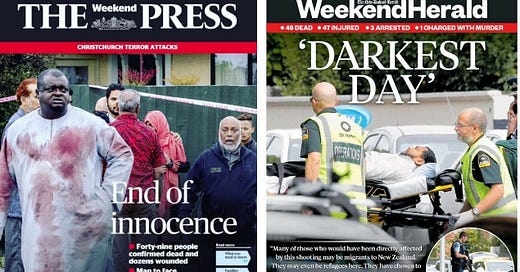Washington DC 13 AUG 2023
Henry Kissinger once dismissed New Zealand as “a strategic dagger pointed at the heart of Antartica”. NZ has all the attributes of a billionaire’s girlfriend: it is pretty and boring. For this reason, it has been chosen by far right extremists billionaires like Peter Thiel, as a country-sized “safe room” to escape to when the civil war they are stoking in America ignites.
But, there’s a catch. The poisoned fruits of the billionaire fascists toolbox are a global fungible commodity that rush like quicksilver to demand signals from vulnerable populations regardless of location, laws, customs and social norms. One of the notable things about the Christchurch terrorist attack was its innate Americanness.
White supremacists and other politically, identity and faith based-extremists, gun down people in America on a near daily basis. Just this week, a self declared “Maga Trumper” Craig Robertson of Provo, Utah, was the subject of an FBI search warrant just before President Biden was to visit Salt Lake City. Robertson had written all sorts of specific threats online including “The time is right for a presidential assassination or two. First Joe then Kamala!!!” Robertson pulled a gun on the FBI, refused warnings to drop it, and was shot dead.

“That doesn’t happen in NZ” was the first thought of people all around the world when they heard the news of the Christchurch attack. It does now. It’s the reason NZ has declared the Trump Proud Boys a terrorist organization. The Christchurch terrorist praised Trump as “a symbol of renewed white identity and common purpose”. In 2023, beautiful and boring NZ is almost as likely to have a Trumpist loon shoot up people for not supporting their extremism, as down-town Provo Utah.
This is a finding of the NZ Security Intelligence Service (NZSIS) 2023 threat assessment. It is one of the most concise and useful primers of Mis/Dis-information Thirdoffset has read and connects the concepts to practical examples in the Indo-Pacific.
The report puts warnings about Trumpism on an equal footing with political warfare activities in NZ conducted by the PRC (and the Iranian IRGC). It brilliantly illustrates the propaganda-distrust-violence cycle. Propaganda weakens societal resilience, causing intensification of feelings of helplessness and vulnerability, that are exploited by extremist “grievances and distrust in ‘traditional’ institutions” leaving some people to “feel they have no other option than to work outside legal and non-violent channels.”
The Report illustrates the impact of global propaganda trends on an otherwise stable and resilient society. That NZ - a hitherto quiet and serene corner of the world - far from the tumult of great power competition and fascism, is susceptible to the artificial manufacturing of political, identity and faith based extremism. NZ is a cautionary tale for all those who support parliamentary democracy, the rule of law, and respectful and peaceful resolution of complex political disputes domestically and internationally. As the report warns, those “that engage in foreign interference are usually autocratic, repressive, or highly nationalistic” and seek to “create fewer opportunities for more collaborative approaches to statecraft”. That of course is the mission of the CCP, Maga and the IRGC.
Key excerpts from the report:
United States (US) -specific ideas and events are often incorporated into New Zealand narratives. The anti-authority narratives, have created new pathways for violent extremism and have provided new opportunities for foreign states to interfere in New Zealand society. The current period of instability and weakness may encourage the further use of coercive and strong-arm approaches by some states to interfere and disrupt.
A study conducted by The Treasury into social cohesion in New Zealand found the reasons for diminishing levels of trust relate to perceptions that people are being deliberately lied to and misled; that those with power don’t have New Zealand’s best interests at heart; and that politicians are incapable of solving the problems facing the country. These factors are often the result of an individual or group’s real or perceived concerns about their place in society, changes in societal and cultural norms, as well as life experiences. In some cases, these concerns are amplified by misinformation and disinformation. However, as a result of grievances
and distrust in ‘traditional’ institutions, people can feel they have no other option than to work outside legal and non-violent channels.Misinformation and disinformation spread in times of social upheaval because they tend to offer simple explanations for complex issues. They also reinforce existing biases or grievances. Misinformation and disinformation is often pitched in a way that makes the consumer feel they have special knowledge, or know the “real truth.”
In these online communities, which often cut across national borders, like-minded people share material and ideas that justify their support for violence. Members encourage people towards uncritical thinking, which disregards alternate solutions or explanations. The nature of these communities build a sense of belonging that strengthen one’s loyalty to the ideology. This, in turn, enhances radicalisation and in exceptional cases, the path leads to mobilisation to violence.
In addition to the threat of Trumpism, the report explains the political warfare activities of the PRC against a wide range of targets in NZ.
NZSIS is aware of ongoing activity in and against New Zealand and our home region that is linked to the PRC’s intelligence services. This is a complex intelligence concern for New Zealand.
Examples include activities
that are intended to influence, disrupt or subvert New Zealand’s communities and non-government sectors by deceptive, corruptive or coercive means. This includes New Zealand’s academic sector – encompassing institutions, employees and students.
The report goes on to detail PRC spying and interference TTPs
A subset of interference is transnational repression, which refers to any effort
of a foreign state intended to prevent acts of political dissent in migrant or expatriate populations. Transnational repression can include a range of acts, some of which have been seen in New Zealand. These include:
Community surveillance, including the monitoring and infiltration of community groups, and the co- option of community figures;
Harassment, threats and assault intended to intimidate individuals into curtailing activities considered threatening by the foreign state;
Proxy punishment, including the harassment, confinement, or harm to relatives in the country of origin as retribution or coercion of an individual abroad; and
Involuntary repatriation, in which individuals are coerced or compelled to return to their country of origin.
A surprise to some might be the reports highlighting of Iranian espionage and political warfare in NZ.
NZSIS has identified the Islamic Republic of Iran undertaking societal interference, including monitoring
and providing reporting on Iranian
The report starts with some very Important caveats
The vast majority of people in New Zealand who have ethnic connections to those states are not a threat. This is an important distinction. NZSIS has no interest in the activities of persons with radical, unconventional, dissenting or alternative beliefs who do not intend to use violence.





